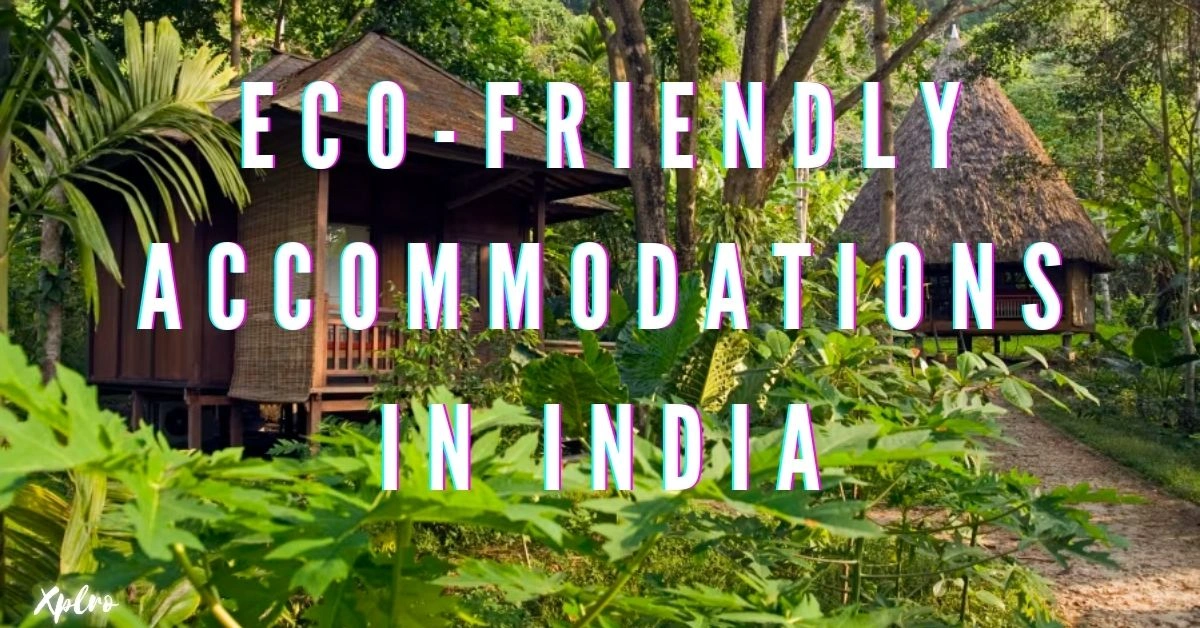Eco-Friendly Accommodations in India; More and more people are choosing to travel in a way that’s good for the planet. Eco-friendly hotels and guest houses are becoming very popular. India, with its beautiful mountains, forests, and beaches, has many places to stay that are kind to the environment. These places offer comfortable rooms and a real experience of India, while also taking care of the earth.
- 1. CGH Earth – Spice Village, Thekkady, Kerala
- 2. Vanghat, Corbett National Park, Uttarakhand
- 3. Barefoot at Havelock, Andaman Islands
- 4. SwaSwara, Gokarna, Karnataka
- 5. Banasura Hill Resort, Wayanad, Kerala
- 6. Dune Eco Village and Spa, Pondicherry
- 7. Shakti 360° Leti, Uttarakhand
- 8. The Himalayan Village, Kasol, Himachal Pradesh
- 9. Elephant Valley, Kodaikanal, Tamil Nadu
- 10. Evolve Back (Orange County), Coorg, Karnataka
- FAQs
1. CGH Earth – Spice Village, Thekkady, Kerala
Location: Nestled amidst the lush Western Ghats, near the iconic Periyar Wildlife Sanctuary.
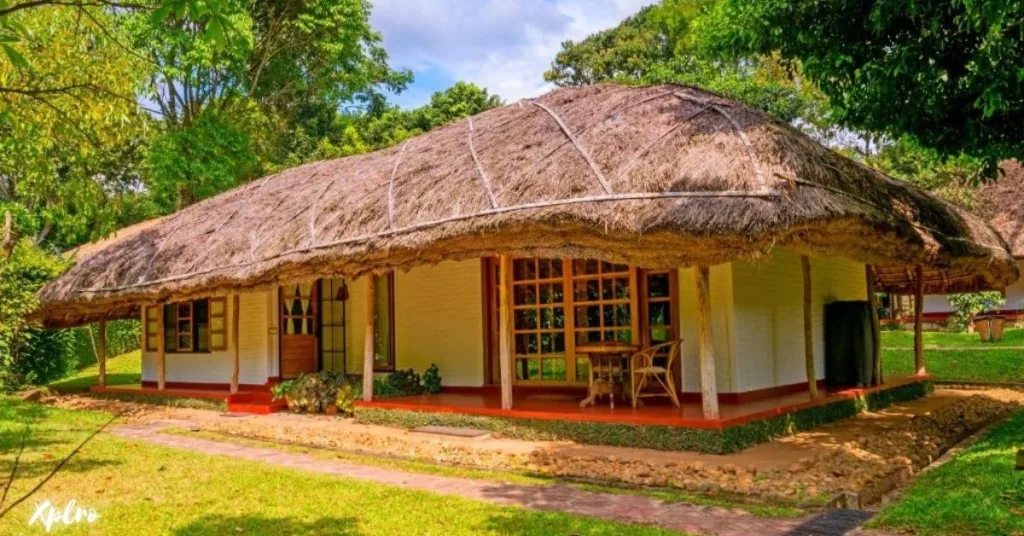
Eco-Friendly Practices: Renowned for its commitment to sustainability, CGH Earth’s Spice Village is a harmonious blend of nature and luxury. The resort features eco-friendly thatched-roof cottages built from local materials. They prioritize rainwater harvesting, composting, and organic farming to minimize their environmental impact.
Key Features:
- Solar Power: Harnessing the sun’s energy for clean electricity.
- Plastic-Free: Promoting a sustainable lifestyle by eliminating single-use plastics.
- Local Delights: Savor fresh, organic cuisine sourced from nearby communities.
- Community Engagement: Supporting local initiatives and empowering the community through eco-tourism.
2. Vanghat, Corbett National Park, Uttarakhand
Location: Nestled along the serene Ramganga River, deep within the Corbett Tiger Reserve.

Eco-Friendly Practices: Vanghat is a sustainable retreat built using traditional techniques and natural materials. Powered by solar energy, the eco-lodge has a responsible waste management system. Its proximity to wildlife fosters a harmonious environment, and the owners are dedicated to promoting conservation awareness among guests.
Key Features:
- Solar Power: Harnessing the sun’s energy for clean electricity.
- Responsible Wildlife Tourism: Observing wildlife in its natural habitat while minimizing disturbance.
- Plastic-Free: Promoting a sustainable lifestyle by eliminating single-use plastics.
- Community Engagement: Supporting local initiatives and providing employment opportunities.
3. Barefoot at Havelock, Andaman Islands
Location: Nestled amidst the lush tropical forests of Havelock Island, Andaman and Nicobar Islands.
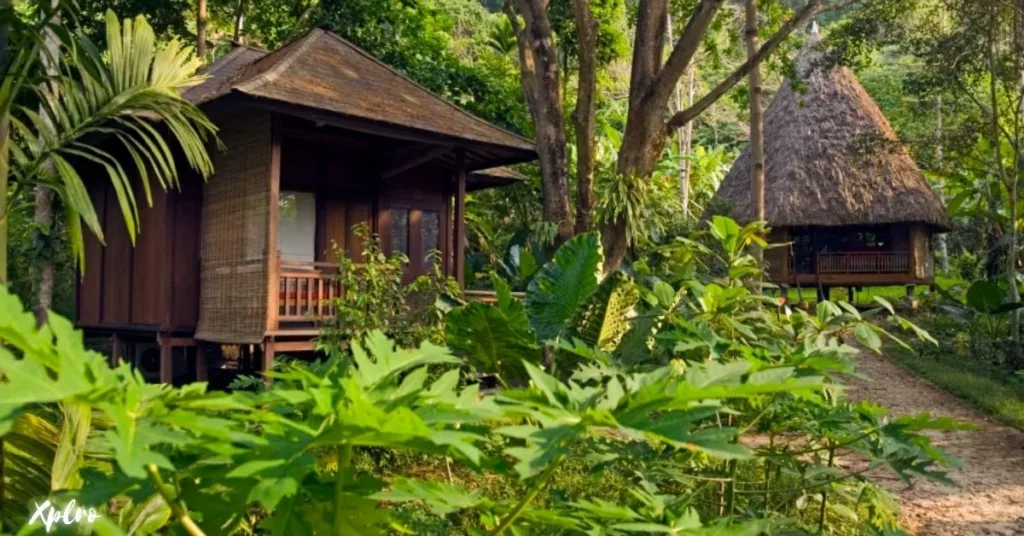
Eco-Friendly Practices: Barefoot at Havelock is a sustainable retreat committed to preserving the island’s natural beauty. The resort is constructed using eco-friendly materials like bamboo, wood, and palm leaves, sourced locally. Its solar-powered energy, eco-friendly waste disposal, and no-air-conditioning policy in the cottages demonstrate its dedication to reducing its environmental footprint.
Key Features:
- Marine Conservation: Supporting initiatives to protect the island’s marine ecosystems.
- Biodegradable Products: Using environmentally friendly products to minimize waste.
- Energy Efficiency: Designed to reduce energy consumption and conserve resources.
- Local Heritage: Promoting local culture, craftsmanship, and sustainable practices.
4. SwaSwara, Gokarna, Karnataka
Location: Nestled amidst the tranquil Om Beach in Gokarna.
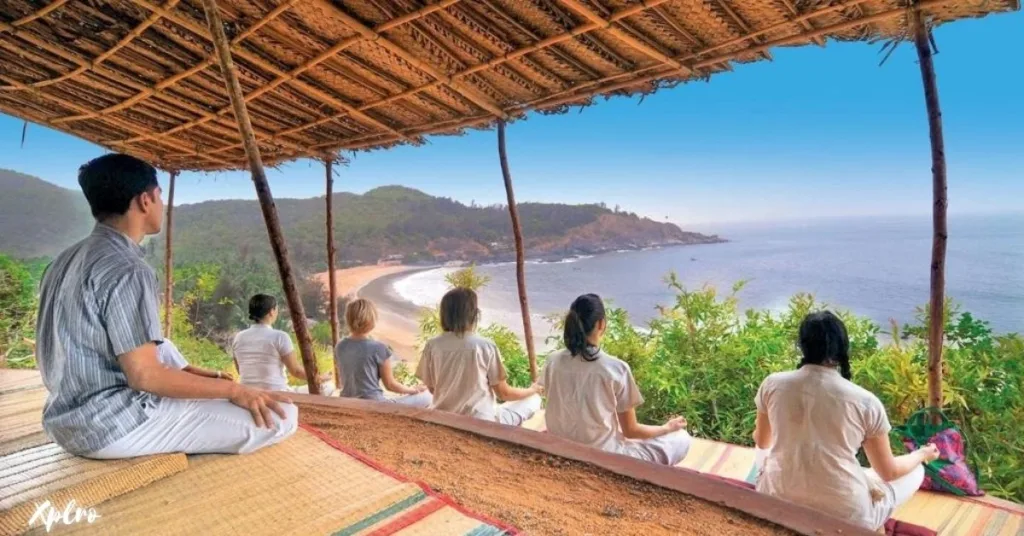
Eco-Friendly Practices: SwaSwara is a wellness retreat dedicated to sustainable living. From using local materials in construction to implementing rainwater harvesting and waste recycling, the resort prioritizes environmental harmony. Their organic gardens provide fresh, locally sourced ingredients for the on-site restaurant.
Key Features:
- Holistic Wellness: Experience yoga and wellness programs aligned with nature’s rhythms.
- Organic Cuisine: Savor farm-to-table dining featuring fresh, organic produce.
- Eco-Friendly Accommodations: Relax in sustainable cottages designed to minimize environmental impact.
- Water Conservation: Utilizing rainwater harvesting to conserve resources.
5. Banasura Hill Resort, Wayanad, Kerala
Location: Nestled amidst the lush landscapes of Wayanad district, Kerala.
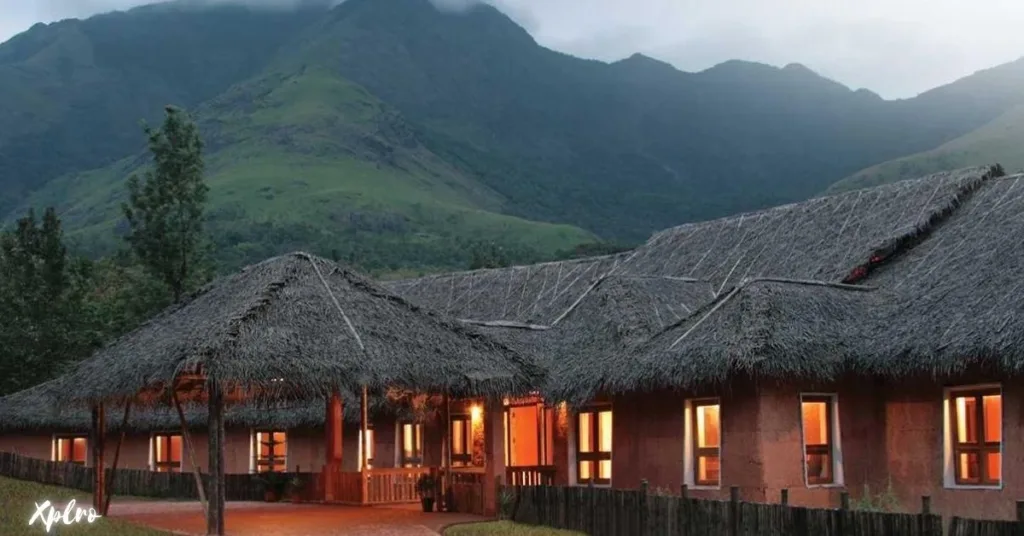
Eco-Friendly Practices: Banasura Hill Resort is a pioneering example of sustainable tourism. Constructed using mud, it’s one of Asia’s largest earth resorts. The resort minimizes its carbon footprint through organic farming, solar power utilization, and effective waste management.
Key Features:
- Cultural Immersion: Experiencing local traditions and connecting with tribal communities.
- Mud Architecture: A testament to traditional building techniques and sustainability.
- Organic Farming: Cultivating fresh, organic produce in on-site gardens.
- Renewable Energy: Harnessing solar power for clean energy.
6. Dune Eco Village and Spa, Pondicherry
Location: Located 30 kilometers from Pondicherry on the scenic Coromandel Coast.
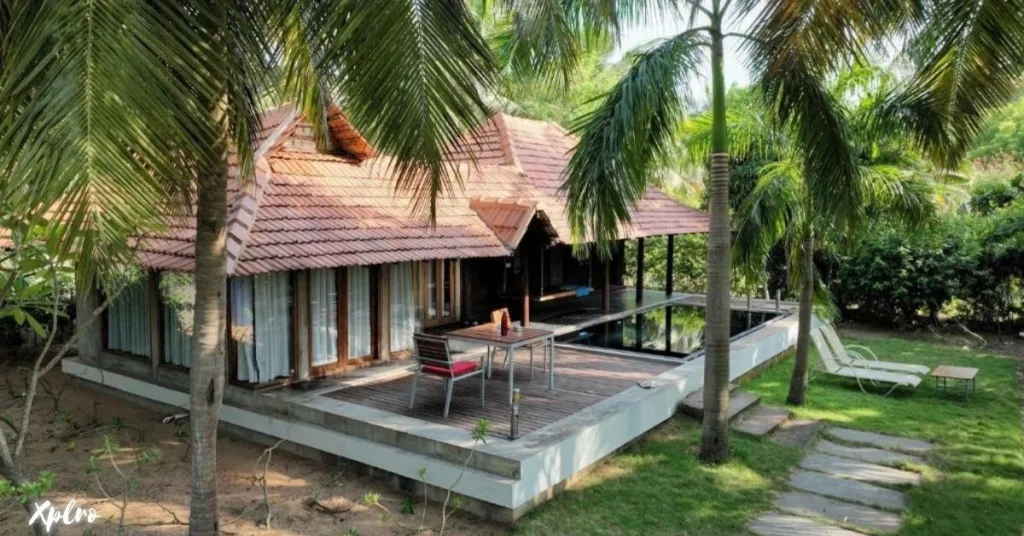
Eco-Friendly Practices: Dune Eco Village is a sustainable retreat committed to preserving the coastal environment. The resort features eco-friendly construction, solar power, and organic farming. The cottages are built using recycled and local materials, and the resort adheres to strict waste management practices.
Key Features:
- Sustainable Construction: Utilizing recycled materials to minimize environmental impact.
- Solar Water Heating: Harnessing the sun’s energy for hot water.
- Plastic-Free: Promoting a sustainable lifestyle by eliminating single-use plastics.
- Organic Cuisine: Indulge in delicious, organic meals sourced locally.
7. Shakti 360° Leti, Uttarakhand
Location: Nestled amidst the breathtaking landscapes of the Kumaon region, Uttarakhand.
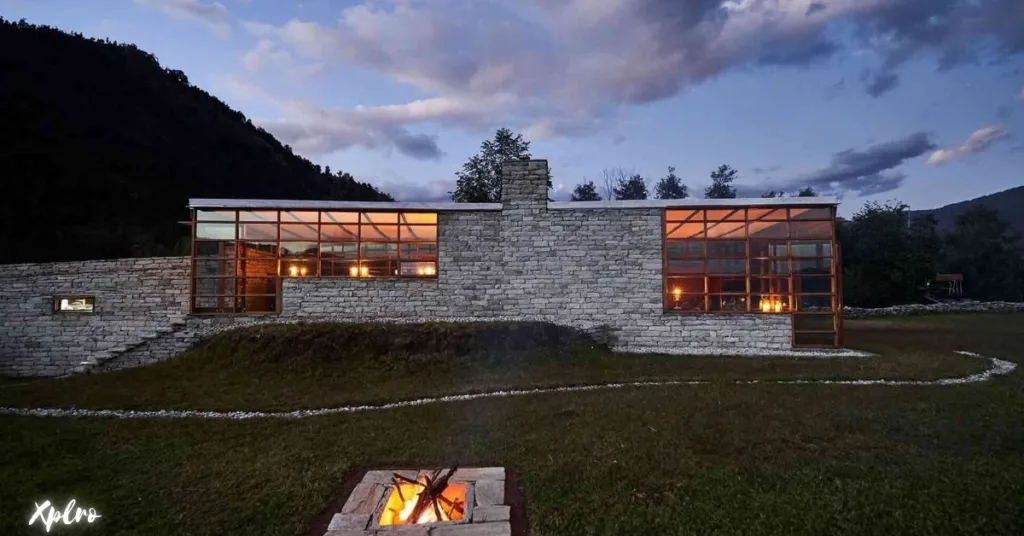
Eco-Friendly Practices: Shakti 360° Leti is a sustainable lodge committed to preserving the local environment. Completely off-grid, the lodge relies on solar power for electricity and heating. They prioritize sourcing food locally and minimize waste generation through the use of biodegradable products.
Key Features:
- Community-Based Tourism: Supporting local communities and promoting cultural exchange.
- Solar Power: Harnessing the sun’s energy for clean electricity and heating.
- Low-Impact Tourism: Promoting responsible travel that minimizes environmental impact.
- Local Cuisine: Savor organic, locally sourced meals.
8. The Himalayan Village, Kasol, Himachal Pradesh
Location: Nestled amidst the picturesque Parvati Valley, Himachal Pradesh.
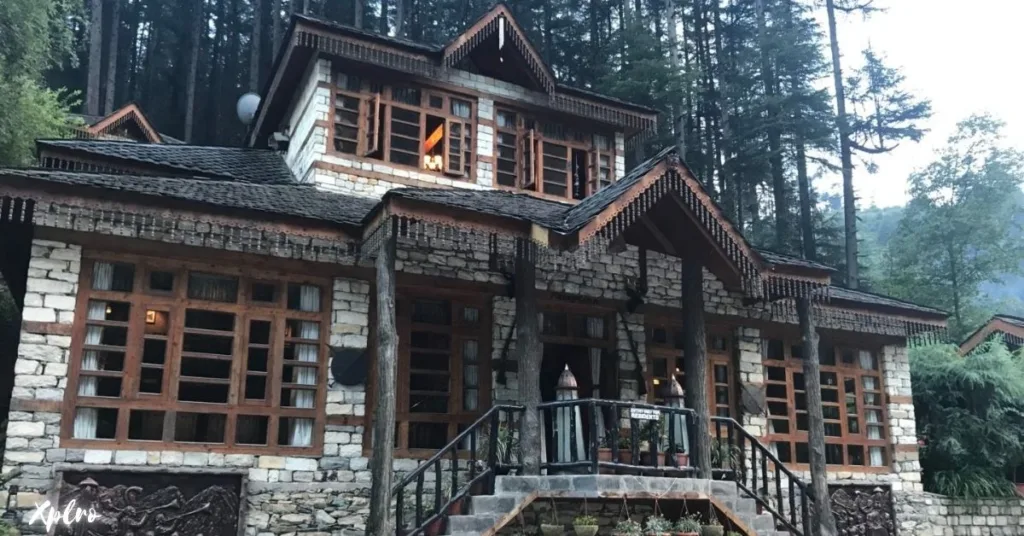
Eco-Friendly Practices: The Himalayan Village is a sustainable retreat built using traditional Kathkuni-style architecture, blending seamlessly with its surroundings. The resort relies on solar power, practices rainwater harvesting, and promotes local craftsmanship. Its design and ethos reflect a deep respect for the environment.
Key Features:
- Organic Cuisine: Enjoy fresh, organic food grown on their own farm.
- Traditional Architecture: Featuring authentic Himachali design using local stone and wood.
- Solar Power: Harnessing the sun’s energy for clean electricity.
- Responsible Tourism: Promoting sustainable travel practices and supporting local communities.
9. Elephant Valley, Kodaikanal, Tamil Nadu
Location: Nestled amidst the picturesque Palani Hills, near Kodaikanal.

Eco-Friendly Practices: Elephant Valley is a sustainable farm stay committed to organic farming, energy conservation, and biodiversity preservation. The property harnesses solar power, grows its own organic food, and contributes to the conservation of local flora and fauna.
Key Features:
- Organic Farming: Enjoy fresh, farm-to-table cuisine grown on-site.
- Solar Power: Utilizing clean, renewable energy.
- Waste Management: Promoting sustainability through composting.
- Biodiversity Conservation: Protecting local plant species and ecosystems.
10. Evolve Back (Orange County), Coorg, Karnataka
Location: Nestled amidst the picturesque hills of Coorg, Karnataka.
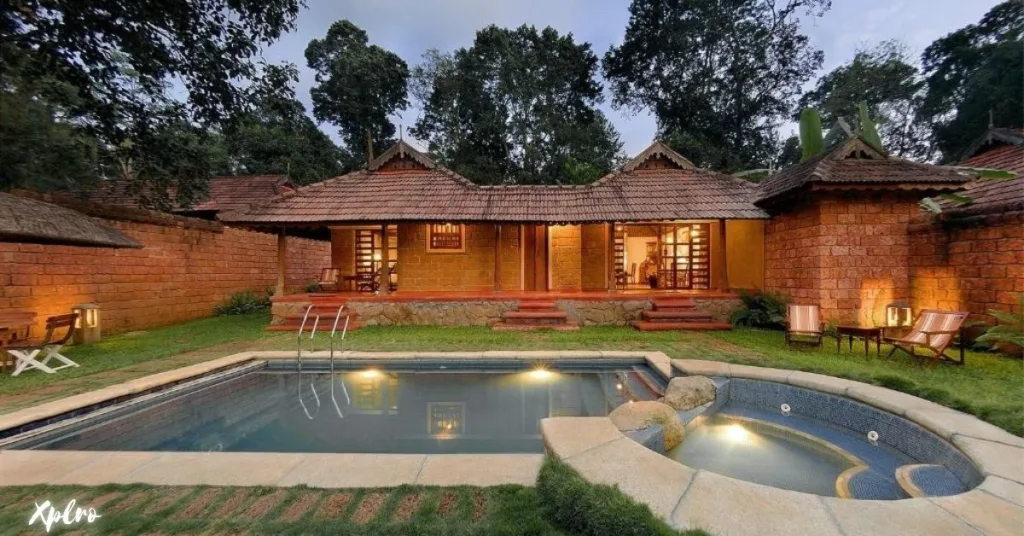
Eco-Friendly Practices: Evolve Back is a luxury resort committed to sustainable practices. The property integrates environmental conservation through renewable energy, organic farming, and effective waste management. Inspired by traditional Kodava culture, the architecture incorporates local materials and techniques.
Key Features:
- Renewable Energy: Harnessing clean energy sources to reduce its environmental footprint.
- Community Engagement: Supporting local initiatives and providing employment opportunities.
- Organic Farming: Cultivating fresh, organic produce for on-site dining.
- Wildlife Conservation: Protecting local wildlife and their habitats.
Conclusion, Eco-Friendly Accommodations in India
Experience the magic of India’s diverse landscapes – from the snow-capped Himalayas to pristine beaches – with a conscience! Choose eco-friendly stays on Xplro.com and contribute to a sustainable future for travel. Our curated selection of eco-conscious accommodations offer comfort, luxury, and a chance to connect with nature responsibly. Embrace responsible tourism with farm stays utilizing renewable energy, mountain retreats built using local materials, and beachside havens promoting plastic-free initiatives. It’s time to explore India’s breathtaking beauty while leaving a positive footprint – discover your eco-adventure today on Xplro.com!
FAQs
1. What is an eco-friendly accommodation?
- An eco-friendly accommodation focuses on sustainability and minimizing its environmental footprint. Eco-friendly accommodations in India utilize renewable energy sources like solar power, practice recycling and composting, conserve water and energy, and source food locally. These accommodations aim to provide comfort while ensuring environmentally responsible practices.
2. Why should I choose eco-friendly accommodations in India?
- Opting for eco-friendly accommodations in India allows you to support sustainable tourism and reduce your environmental impact. These accommodations promote environmental conservation, protect natural habitats, and engage with local communities. By staying at eco-friendly properties, you can enjoy an immersive experience while contributing to a greener planet.
3. Are eco-friendly accommodations in India more expensive than regular hotels?
- The cost of eco-friendly accommodations in India can vary. Some luxury eco-resorts may have higher prices due to the sustainable initiatives they implement, while other options in rural or remote areas can be more affordable. Generally, the price reflects the eco-conscious efforts, such as using renewable energy, organic farming, and waste management systems.
4. What are some key features of eco-friendly accommodations in India?
- Key features of eco-friendly accommodations in India include solar or wind power, rainwater harvesting, sustainable architecture using natural materials like bamboo or stone, and responsible waste management practices. These accommodations often provide organic food, use minimal plastic, and offer activities that support conservation and community development.
5. Do eco-friendly accommodations in India offer luxury amenities?
- Yes, many eco-friendly accommodations in India combine sustainability with luxury. Properties like Evolve Back and CGH Earth offer premium services, such as spa treatments, gourmet organic dining, and private pools, while still adhering to eco-friendly practices like renewable energy use and conservation efforts. You can experience both luxury and environmental responsibility.
6. Can eco-friendly accommodations in India cater to families?
- Absolutely! Many eco-friendly accommodations in India are family-friendly and offer a range of activities suitable for children. From guided nature walks and wildlife safaris to organic farm tours, these experiences are both fun and educational. Families can enjoy quality time while learning about sustainability and nature conservation.
7. How can I ensure that the eco-friendly accommodation in India I book is truly sustainable?
- To verify if an eco-friendly accommodation in India is genuinely sustainable, look for certifications such as LEED, Green Globe, or EarthCheck. These certifications indicate that the property adheres to global sustainability standards. Additionally, you can research guest reviews, visit the property’s website to learn about their eco-practices, or contact them to ask about their environmental policies.
8. Are there eco-friendly beach resorts in India?
- Yes, eco-friendly beach resorts in India are gaining popularity. For instance, Barefoot at Havelock in the Andaman Islands and Dune Eco Village and Spa in Pondicherry are excellent examples. These resorts focus on sustainable construction, minimize waste, and encourage eco-friendly activities like snorkeling, diving, and beach clean-up initiatives to protect marine ecosystems.
9. Can I participate in sustainable activities while staying at eco-friendly accommodations in India?
- Many eco-friendly accommodations in India offer guests the opportunity to engage in sustainable activities. From organic farming and yoga sessions to wildlife safaris and cultural workshops, these activities not only enrich your travel experience but also support local communities and environmental conservation. Participating in these activities can help you connect with the local environment on a deeper level.
10. Are eco-friendly accommodations in India suitable for solo travelers?
- Yes, eco-friendly accommodations in India are an excellent choice for solo travelers. These properties often provide serene, natural environments perfect for reflection and relaxation. Solo travelers can enjoy eco-conscious wellness activities like meditation, guided treks, and yoga while benefiting from a peaceful retreat away from the crowds.
11. How do eco-friendly accommodations in India support local communities?
- Eco-friendly accommodations in India often work closely with local communities. They employ local staff, source food and materials locally, and support traditional crafts and artisans. Some properties even initiate community development projects, such as providing education or healthcare facilities to nearby villages, ensuring that tourism benefits both the environment and local populations.
12. Are eco-friendly accommodations in India safe to visit during the monsoon season?
- Most eco-friendly accommodations in India are well-prepared for the monsoon season, especially in regions that experience heavy rainfall. Many properties have sustainable infrastructure like rainwater harvesting and flood prevention measures in place. However, it’s always advisable to check local weather conditions and contact the accommodation to confirm their monsoon preparedness before planning your stay.




